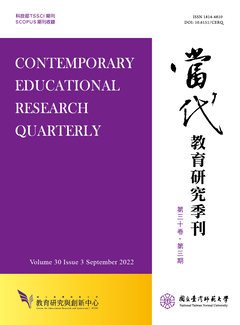

研究目的
父母親職參與對於學齡前幼兒的語言發展至關重要。近年來隨著家庭經濟及結構的改變,父母在親職參與的角色也逐漸轉變。本研究的目的在探討我國三歲幼兒所處雙親家庭中親職參與及社會經濟背景的現況,親職參與、家庭社會經濟背景對幼兒語言發展的影響,以及親職參與在家庭社會經濟背景和幼兒語言發展間的中介角色。
研究設計/方法/取徑
本研究使用臺灣幼兒發展調查資料庫(KIT)幼兒第一波(36月齡)家長問卷資料,並選取受訪者為雙親家庭幼兒之資料共1,815筆進行分析。研究採用結構方程模式探討家庭社會經濟背景、親職參與及幼兒語言發展的因果及路徑關係。
研究發現或結論
本研究將親職參與分為「育兒勞務及生活規範」參與、「親子互動」參與兩種類型。研究發現,父母在兩類型親職參與的程度都達到「經常」以上的程度,顯示在家庭經濟及結構改變後,父母親職參與的程度有所改變。在親職參與、家庭社會經濟背景及幼兒語言發展關係方面,本研究發現「親職參與」中的「親子互動參與」才是直接影響幼兒語言發展的最主要因素。父母親子互動參與及家庭社會經濟背景都會影響幼兒語言發展,其中親子互動參與對幼兒語言發展影響比較大(β=.27),家庭社會經濟背景對幼兒語言發展的影響次之(β=.17),而親子互動參與在家庭社會經濟背景和幼兒語言發展關係間的中介角色為部分中介。
研究原創性/價值
本文為首篇以全臺灣代表性樣本,對臺灣36月齡幼兒進行親職參與、家庭社會經濟背景及語言發展影響關係之研究,並利用結構方程模式對不同親職參與類型影響幼兒語言發展的因果關係模式進行比較分析。本文之研究結果可以作為國家幼兒語言發展和家庭教育政策參考,也可以讓父母瞭解如何在幼兒語言發展過程中扮演最佳的角色。
Purpose
Parental involvement is extremely important for the language development of preschool children. With changes in family economics and structures in recent years in Taiwan, parental involvement has also gradually changed. The aim of this study was therefore to investigate the current state of parental involvement with three-year-old children and the socioeconomic status (SES) of two-parent families. The study examines how parental involvement and SES influence children's language development, and whether parental involvement can mediate the relationship between SES and children's language development.
Design/methodology/approach
This study utilized data from the first wave parent questionnaire of the Kids in Taiwan: National Longitudinal Study of Child Development & Care (KIT) database. The subjects were two-parent families with 36-month-old children, and a total of 1,815 responses were selected for analysis. Structural equation modeling was employed to analyze the causal relationship between children's language development and the two factors, parental involvement and family’s socioeconomic background.
Findings/results
This study divided parental involvement into two types: “childcare labor and living routine rules” and “parent-child interaction.” We found that the degree of parental involvement in the two types of parental work has reached the “frequent” level, which shows that the degree of parental involvement has changed after changes in family finances and structure. As far as the relationship between parental involvement, family’s socioeconomic background, and children’s language development is concerned, this study found that “parent- child interaction” in “parental involvement” is the most important factor that directly affects children’s language development. Parents’ interaction with their children and the family’s socioeconomic background both affect children's language development. Specifically, parent-child interaction was found to have a relatively high degree of influence on children's language development (β=.27), followed by family socioeconomic background (β=.17). Parent-child interaction was found to partially mediate between SES and children’s language development..
Originality/value
This study was the first survey investigating the effect of parental involvement and socioeconomic background on the language development in 36-month-old children with a representative sample from Taiwan. Structural Equation Modeling was employed to compare and analyze the causal relationship between different types of parental involvement and their impact on children’s language development. Findings of this study can serve as a guide to improve policies on child language development and family education in Taiwan, and help parents understand their optimal roles in their children’s language development.

This work is licensed under a Creative Commons Attribution-NonCommercial 3.0 Taiwan License.
Center for Educational Research and Innovation, National Tawain Normal University
162, Ho-Ping East Rd, Sec. 1, Taipei, Taiwan | Tel:+886-2-7749-3670 | E-mail: cerecerq@gmail.com
CERI | NTNU | E-mail Alerts | Open Journal System
© 2014 CERI-NTNU
